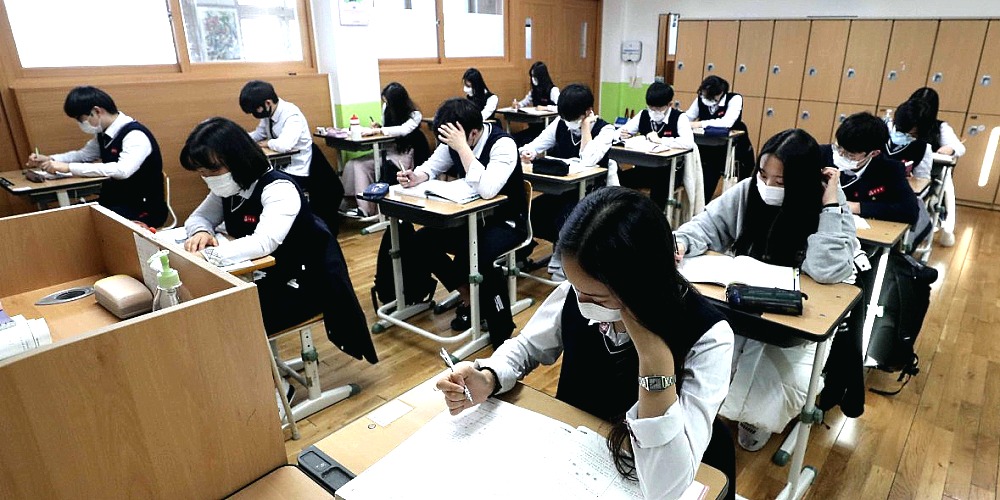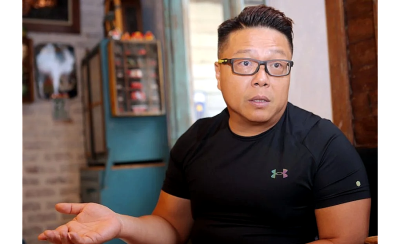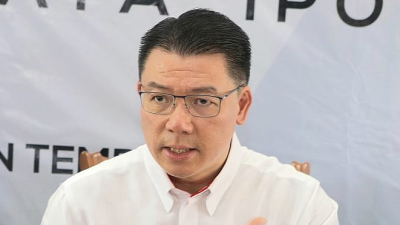South Korea’s Education Ministry unveiled new plans aimed at reducing students’ excessive reliance on private education in preparing for the country’s college scholastic ability test, known as the Suneung.
At the heart of the plans is setting up a ministry-level committee made up of public school teachers, which will adjust the difficulty level of the Suneung by excluding so-called “killer questions” — usually the most difficult test questions covering topics often outside the curriculum — from the college entrance exam starting from this year.
The underlying logic is that students and parents are forced to spend too much money on private hagwons and tutoring largely because the exams include what is not taught in the public school curriculum in the form of those killer questions.
Education Minister Lee Ju-ho said the ministry is “committed to taking action against the private education cartel profiteering from students and parents,” and the presidential office on the same day hinted at taking legal action against those who take advantage of the killer questions for the Suneung.
The new measures to adjust the difficulty level of the Suneung and lessen the financial burden related to private education came after President Yoon Suk Yeol instructed the education minister on June 15 to exclude any material not covered in school from the annual entrance exam.
The Yoon administration also claimed that some teachers and professors who participated in making Suneung questions have sold questions to private academies, calling it “a private education cartel.”
The Education Ministry on Monday presented 22 killer questions it found after conducting a review of the exams in the past three years and the mock test in June.
The killer questions contained high-level concepts that were not taught in the public education system, which officials said put those who got private education at an advantage compared with students who just follow the regular curriculum.

The government’s policy focus on excluding test questions that are not taught in school seems to be a belated, yet right course of action in terms of fairness for students in a nation where the Suneung is deemed a make-or-break exam that determines one’s career and long-term income.
Last year alone, Korean parents and students spent a record 26 trillion won ($19.9 billion) on private education.
Students from elementary to high school spent 410,000 won per month last year, up a whopping 50.9 percent from 2017, according to the Education Ministry.
There is no doubt that students’ heavy dependence on private education further distorts the domestic education market, which has long been saddled with a variety of issues including excessive competition.
But excluding killer questions will not fix the fundamental problem plaguing the Korean education system in general nor the fiercely competitive entrance exam in particular.
One revealing fact is that some of the 22 killer questions that the Education Ministry viewed as unfair include those which resulted in a correct answer ratio of 36 percent, as well as content linked to education materials produced by state-run education broadcaster EBS.
The apparently problematic classification of questions in terms of difficulty stems from hurried and sloppy preparation before announcing such a crucial policy change that affects all high school students and their parents, mainly because of Yoon’s abrupt instruction about the killer questions.
Of course, presidents are entitled to talk about the country’s education policy and set a broad policy direction in consultation with officials from the Education Ministry and experts in related fields.
But in Korea, ministry officials are left to scramble to come up with half-baked policies in a short period of time — just 11 days in this case — when a president points out a problem.
More importantly, it is highly questionable whether the elimination of killer questions will resolve the issue of heavy reliance on private education.
Regardless of whether the Suneung includes such questions or not, the overheated private education market is unlikely to cool down as long as the cutthroat competition for making it into prestigious universities remains unchanged.
To fix the chronic private education problem, the government has to devise policies designed to restore and strengthen the role of public education, and overhaul the college entrance exam in a way that gives universities more freedom in screening applicants — a project that needs long-term planning and concerted efforts from all stakeholders.
ADVERTISEMENT
ADVERTISEMENT








































